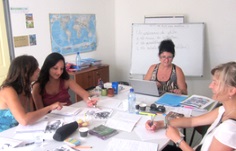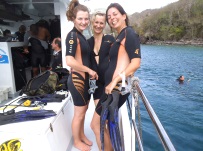Sun, sea, sand and French…in exotic Martinique
Assistant Director of Studies Leticia Artiles has taken many language courses, but this one might top them all…
This is the fourth time I have taken a week of to do a language holiday. I think I can admit I am addicted to them. French was the chosen language. The experience last year in Antibes (see my review here), on the coast of France, was fabulous: I did not think it could get any better, but I was absolutely wrong.
Living in England makes you want to choose a sunny destination, and France in summer is very sunny – but I wanted something different this time, something further and more adventurous. A place where I could have French immersion and where I could feel I was definitely on holiday.
Among the wide range of destinations that Cactus has to learn French, a very special one stands out: Martinique! Do they speak French there? Oh yes, they do (apart from creole). Is it a good holiday destination? It’s an island and it’s in the Caribbean Sea. Just in case that was not enough to make me choose it (and it really was enough!), it’s part of France, which means you need no visa if you are a citizen of the European Union, plus they use the Euro.
It was clear that the experience was going to be a good one, but I did not imagine it would be as good as it was. I went this time with a work colleague but this is the perfect destination to go with your family or also on your own.
We took a 20 hours of French in the mornings. This allows you plenty of time once classes have finished to go and explore the little paradise that this island is. The school also offers the option to combine French with kite surfing or diving lessons. Many other activities are also available.
The school is a small school based in the capital, Fort-de-France. We were staying in Trois Ilets in a beautiful apartment in an attractive tourist area. This area had very nice beaches, lovely restaurants to indulge in local food and bars with delicious cocktails. The school also offers other accommodation options such as host families or residences.
The fun started every morning when we had to go to the school by boat. Nothing better than starting the day early with the fresh breeze and 30 degree sunshine in your face.
The lessons were entirely in French; no other language was used in the classroom. Although my level was lower than that of my classmates, I think I managed to make a massive improvement. The methodology followed is very communicative and tasked-based, so it was a good way for me to learn not only from the teacher but also from the other people in the classroom. After a week my vocabulary had grown considerably and my pronunciation was much, much better. The teacher was excellent and she included a lot of cultural contents related to Martinique and to the ultramarine territories of France which I valued a lot as these are not usually included in other French courses. We even had the chance to learn the basic steps of Zouk and to try some traditional dishes, all at the school!
Our course included a diving lesson. We could have done more than one, but we had no idea how good it was going to be and we also wanted to make the most of our time on the island, explore the diverse landscapes, etc. Taking diving lessons is something that I recommend everyone to do. I never thought that those beautiful shapes and colours did actually exist under the sea. And all is perfectly organized through Cactus and the school.
There were not enough hours in the day, nor enough days in the week, to enjoy every taste of the delicious gastronomy and tropical fruits; to be amazed by every flower and animal; to appreciate every nice gesture and the will of locals to speak to you and explain to you their culture; to learn every step to dance the Caribbean rythms of zouk; to try some of their numerous brands of rhum…
A week was enough, however, to realize that it’s true what they say: Martinique is “a small island with a big heart”.
Cactus offers French courses in Martinique, France and Canada. We also offer French courses in the UK to help you learn the basics or brush up on existing skills before you head off.












